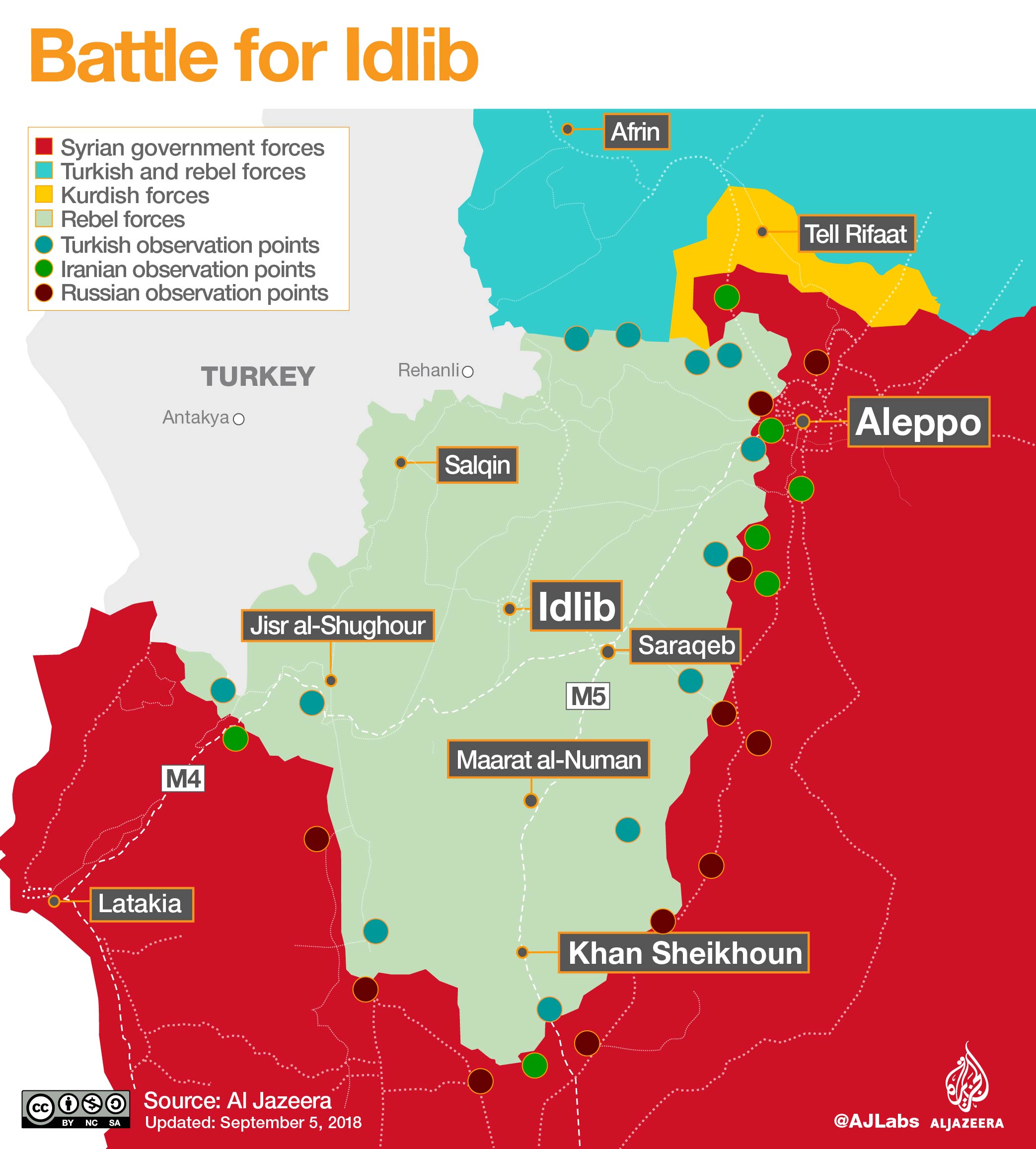Idlib: Temporary lull sets in after days of intense bombardment
Antakya, Turkey – A temporary calm has settled over the rebel-held areas in northwest Syria, allowing some civilians to return to their homes after fleeing an intensive bombardment by Russian and Syrian government forces.
The government of Syrian President Bashar al-Assad, backed by allies Russia and Iran, has been preparing a large-scale military onslaught to capture the northwest province of Idlib, the last rebel stronghold in the country hosting some three million people, and adjacent areas.
Air raids and shelling of southern Idlib and northern Hama provinces escalated over the past week after Moscow and Tehran rejected a Turkish ceasefire proposal at a trilateral summit held in the Iranian capital on September 7.
The renewed bombing campaign led to the flight of more than 30,000 people from rebel-held areas in northwest Syria since early September, according to the United Nations.
Abdullah Mohamed, 26, and his family were among them. The father of one told Al Jazeera that they were forced to flee Jisr al-Shoghour, a town in southwestern Idlib province, and seek refuge in the relative safety of the countryside.
But after spending two days in a nearby village, they have now headed back home as Mohamed could not afford to pay for shelter for his family.
“Because of the wave of people fleeing, the rent in nearby villages skyrocketed. It is now up to $300 a month,” Mohamed said on Tuesday, adding that tents are also difficult to find and cost as much as $100.
Mohamed said a small number of Jisr al-Shoghour residents had also returned to the town, but the majority of them – around 6,000 – were still sheltering elsewhere.
Fearing the resumption of the bombardment, they were either residing with relatives or in camps along the Syrian-Turkish border, added Mohamed, who is originally from Latakia province and has already been displaced four times over the past three years.
Abd al-Kareem al-Rahmoun, a member of the White Helmets, a civil defence group operating in rebel-held parts of Syria, told Al Jazeera that amid the temporary respite few families in northern Hama province were able to go back to their homes.
He estimated that around 5,000 families had previously fled the area, with some heading north to the camps that have popped up along the border with Turkey, and others taking shelter in the fields outside villages and towns.
 |
According to Dr Habib Khashouf, a member of the doctors’ union in Idlib province, as of September 9 the number of internally displaced persons (IDPs) who arrived at the camps in northern Idlib province during the recent escalation stood at 8,000.
Khashouf said many of the camps were not prepared to deal with the influx of people.
Amid the worsening conditions, there is a shortage of tents and adequate food provision, as well as delays in medicine shipments due to the departure of many foreign organisations from northern Syria over the past year, he added.
Soleiman Abu al-Bara, who worked previously with the Qatari Red Crescent, told Al Jazeera that despite the temporary lull in the bombardment, there are still IDPs arriving at the camps in the north. According to him, hundreds are forced to spend the night without a shelter due to a lack of space and tents in the camps.
Mark Lowcock, the UN’s secretary-general for humanitarian affairs and emergency relief, said that a major assault on opposition-held areas in northwest Syria could force 800,000 civilians to flee to the Turkish border and risked provoking the worst humanitarian catastrophe of the 21st century.
The Turkish government has also warned against an attack on opposition-held territories.
In an op-ed published in the Wall Street Journal on Monday, Turkish President Recep Tayyip Erdogan called on the international community to take action and said that an offensive on Idlib province would result in “serious humanitarian risks for Turkey, the rest of Europe and beyond”.
“Innocent people must not be sacrificed in the name of fighting terrorism,” he wrote.
Turkish officials have also signalled that the country will not be able to accommodate another wave of refugees. Turkey, which has recently sent reinforcements to its borders to prevent the influx of more refugees, currently hosts more than three million Syrians.
Turkish aid organisations also support a number of camps on the Turkish-Syrian border.




